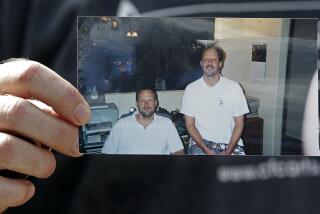Slot Machine Cheater Tells Jury How to Ring Up Phony Jackpots
- Share via
RENO — The government’s star witness in the trial of an alleged gang of slot machine cheaters told a federal court jury Thursday how he used keys, drills, wires and magnets to ring up phony jackpots.
Ross Durham, 28, a Las Vegas native, testified that he went to a gambling school to learn about slot machines. He also obtained a machine and practiced on it for days at a time to devise ways to rig it, aided by the manufacturer’s technical manuals that came with it.
Reviewing evidence seized in a search of defendant William Cushing’s Sacramento home, Durham said the gang used keys marked with casino names, locks stolen from a casino, a magnet allegedly used to disrupt computer circuitry in slots, and diagrams of slot machines.
Durham’s testimony came at the U.S. District Court trial of eight people suspected of bilking Nevada and New Jersey casinos out of jackpots by rigging slot machines.
Under Sentence
Durham pleaded guilty to reduced charges and received a five-year sentence in return for his testimony. He is in the government’s witness protection program. Witnesses have testified that it was Durham who rigged the bogus payoffs for the ring by tinkering with the machines while screened by other members of the gang who acted as “blockers.”
Durham said he and Cushing obtained or manufactured keys to fit machines in numerous Las Vegas and Reno casinos.
He said he taught himself about locks and became “pretty good” at picking them and “reading” them--learning how to duplicate a key simply by seeing it.
“We had pretty much every key we wanted in Las Vegas and Reno,” he said.
‘Everyone Doing It’
However, he said, he and his companions stopped using keys “because everyone else was doing it” and casinos were increasing security against cheating.
Durham said he began using a magnet and a stiff wire to set up jackpots that were pulled off by “collectors” recruited for that purpose. Casino publicity releases often included pictures and stories about the “lucky winner.”
More to Read
Sign up for Essential California
The most important California stories and recommendations in your inbox every morning.
You may occasionally receive promotional content from the Los Angeles Times.













